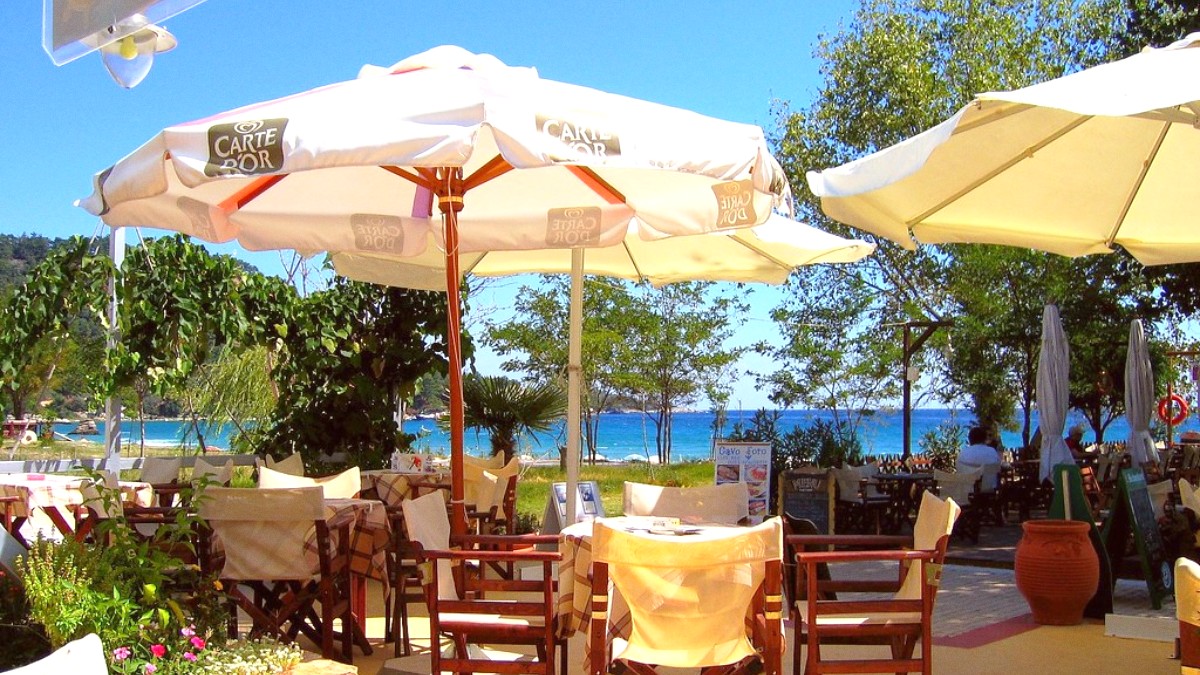
Northeastern Aegean Islands, Greece
Spring (April-May) temperatures range from 15°C to 25°C. Precipitation is low, and humidity levels remain pleasant. This period is ideal for hiking, cycling, and sightseeing, as the weather is comfortable for outdoor activities. Days are long and sunny, perfect for exploring historical sites without the intense summer heat.
Autumn (September-October) temperatures remain warm, typically between 20°C and 28°C. Precipitation decreases, and the air retains a pleasant humidity. The sea remains warm enough for swimming well into October, making this an attractive period for beach lovers who prefer fewer crowds. The landscape begins to transition, but the overall feeling is still one of summer's warmth.
Beach and Swimming: June to September. Hiking and Cycling: April to May and September to October. Sightseeing and Archaeology: April to June and September to October. Water Sports: July and August.
Always check ferry updates during windy periods.
July-August
Hottest weather, warmest sea, fully operational services, lively atmosphere.
Crowded beaches, highest prices for accommodation and flights, intense heat.
May-June & Sept-Oct
Pleasant temperatures, fewer crowds, lower prices, warm sea for swimming.
Early May/late Oct: some smaller services may not be fully operational.
November-April
Few tourists, genuine local atmosphere, lowest prices, lush spring scenery.
Many hotels/restaurants closed, reduced ferry services, not for beach activities.
Greece is a member of the Schengen Area, shaping visa and entry rules. Non-EU, non-EEA, and non-Swiss citizens often need a Schengen visa for stays up to 90 days within any 180-day period, unless their nationality qualifies for visa-free entry. Citizens of many countries, including the United States, Canada, Australia, New Zealand, and the United Kingdom, enter Greece visa-free for tourism or business for up to 90 days. For Schengen visa applications, apply through the Greek embassy or consulate in your country of residence well in advance.
Your passport must maintain validity for at least three months beyond your intended departure date from the Schengen Area. It also needs to have been issued within the last 10 years and feature at least two blank pages for stamps. Officials may request proof of sufficient funds, a return or onward ticket, and accommodation booking confirmations. Travel insurance is highly suggested for all travelers; for Schengen visa applicants, it is mandatory, covering a minimum of €30,000 for medical emergencies and repatriation.
For non-EU/EEA/Swiss citizens, up to 90 days in 180 days.
3 months beyond departure, issued within 10 years, 2 blank pages.
Proof of sufficient funds and return/onward tickets.
Confirmations for your entire stay.
Mandatory for Schengen visas, covering €30,000 medical.
Prices vary based on your travel style and the season. The official currency in Greece, including Thasos, is the Euro (€).
These figures represent approximate daily costs for different travel styles on Thasos, excluding flights to Greece.
Typical price ranges for expenses.
Protect your well-being with these simple measures.
A comprehensive travel insurance policy is highly recommended. It covers medical emergencies, emergency medical evacuation, trip cancellation, and lost or stolen luggage. Purchase insurance as soon as you book your trip for maximum coverage. Carry a small card with your blood type, allergies, and emergency contacts in English and Greek.
General European Emergency Number: 112 (connects to ambulance, police, fire department).
Police (immediate): 100. Ambulance: 166. Fire Department: 199. Coast Guard (Port Authority): 108. In an emergency, clearly state your location, the nature of the emergency, and your contact information. Stay calm and follow instructions.
Comprehensive travel insurance covers medical emergencies, trip cancellation, and lost luggage, safeguarding your journey.
Covers medical emergencies and evacuation.
Lack of coverage can lead to high out-of-pocket costs.
Staying healthy prevents disruptions. Awareness of local concerns and access to a basic first-aid kit keeps you ready.
Sun protection and insect repellent are your friends.
Sunburn and dehydration are common, avoid them.
Knowing local emergency numbers and maintaining awareness are simple steps for a secure visit to the island.
Common sense helps prevent petty theft.
Unattended valuables pose a risk.
| Category | Budget (€) | Mid-Range (€) |
|---|---|---|
| Accommodation (per night) | 30-60 | 60-120 |
| Meals (per person) | 5-10 | 15-30 |
| Transportation (daily) | 5-10 (bus) | 30-60 (car rental) |
Thoughtful packing and preparation enhance your travel experience.
Pack pain relievers, antiseptic wipes, bandages, blister plasters, anti-diarrhea medication, and antihistamines.
Carry in original packaging with a copy of your prescription or doctor's note.
Bring insect repellent and Sun protection (high-SPF sunscreen, after-sun lotion).
Plan to rent or bring gear tailored to your activities.
For hiking, a Lightweight daypack and sturdy hiking shoes are recommended. Snorkeling gear, bicycles, cars, and ATVs are available for rent across the island. Bringing your own Snorkeling gear ensures a proper fit and hygiene.
For beach visits, a Beach towel (a lightweight Microfiber towel dries quickly), a Portable beach mat, and a small, foldable sun umbrella are practical. Items like a Spacious beach bag and a Waterproof phone pouch are useful.
No unique specialty items are necessary beyond general Travel gear for a Mediterranean island.
Greece uses 230V, 50Hz, Type F (Schuko) and Type C outlets. Bring a European travel plug adapter; a Voltage converter might be needed for non-dual voltage devices.
Most smartphones work. Consider a local SIM card from Cosmote, Vodafone, or Wind (Nova) for data. Airalo is an eSIM option for travelers.
A mirrorless/DSLR camera or a Good smartphone camera capture memories. A Waterproof action camera like a GoPro is for underwater shots. Bring Portable chargers for devices.
Carry original and copies of important papers.
Stay connected and safeguard your data.
Google Maps (offline maps), Google Translate (offline language packs), Ferryhopper/OpenSeas for ferry schedules.
NordVPN or ExpressVPN for secure browsing, airline/hotel apps.
Cloud storage (Google Drive, Dropbox) or a Small external hard drive for photos.